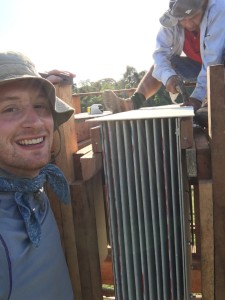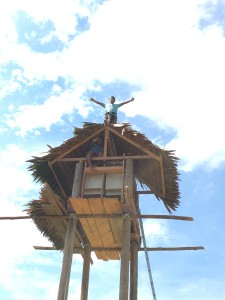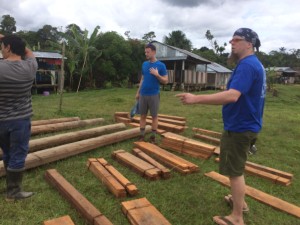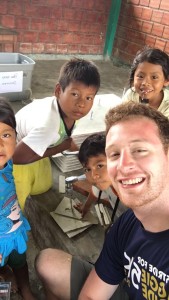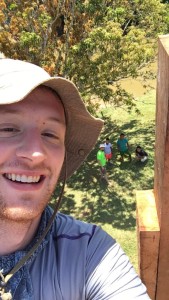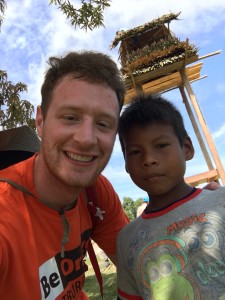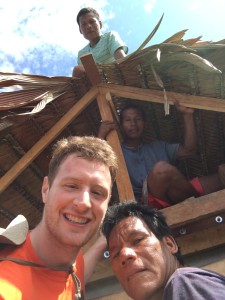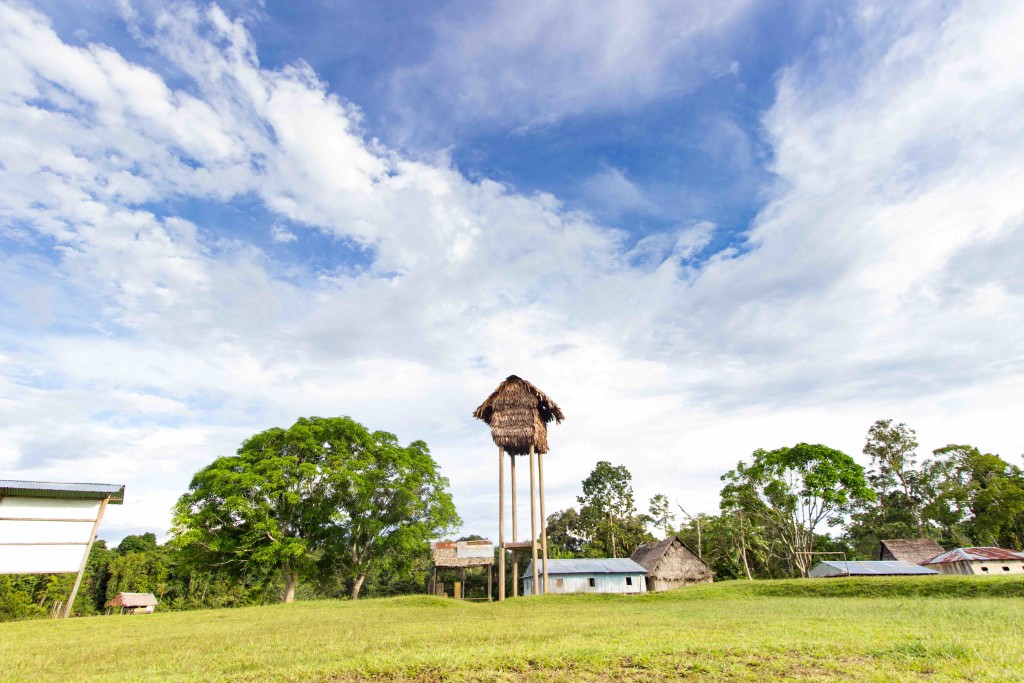
By Emily Christensen
Four years can seem like a lifetime in a college student’s world. During those 1,460 days, they will have enrolled in more than 20 courses; attended or been a part of multiple Homecomings, music concerts, and athletic events; taken more tests than they can count; and grown from a recent high school graduate into a young adult ready for the world.
Interspersed in that, Tyler Vogel ’17, a biology major from Oelwein, can add serving as student body president and trying to save the world—or at least a small village in Peru.
As a freshman, Vogel was one of three Wartburg students to receive a provisional $5,000 Clinton Foundation Resolution grant at the Clinton Global Initiative University. Thousands of students annually submit ideas to CGIU, founded by former President Bill Clinton “to engage the next generation of leaders on college campuses around the world” by “coming together to discuss and develop innovative solutions to pressing global issues.” Only 1,200 groups are invited to the conference and only two dozen are selected for the grant competition.
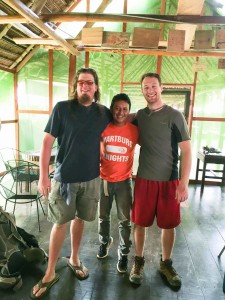
This spring, just a few months before his graduation, he finally saw his research—which proved that a bat species capable of devouring 1,000 mosquitoes per hour could be used to combat malaria—put into action in the Sucusari community in the heart of the Amazon.
“It was worth every second I put into it,” Vogel said. “When we left the village for the last time, seeing the bat house completed and how excited the community was to have this opportunity, it was a dream come true. I always thought this was a good idea, but figured we were just fast-talking freshmen and it would never really happen.”
Big ideas, few opportunities
When Vogel; Isaac Chikuse ’16, of Malawi; and Ana Julante ’17, of Angola, presented Wings of the Night at Arizona State University in March 2014, they told judges they had found a way to combat malaria in Lilongwe, Malawi, using a small colony of insectivore bats.
Though CGIU judges found value in the project and granted them a provisional fellowship, the trio faced multiple roadblocks during the implementation phase. Their attempts to connect with African officials were either ignored or rejected.
“We spent the better part of two years working with Bat Conservation International, trying to get a bat house in Malawi, but it is incredibly difficult if you don’t know anyone on the ground,” said Dr. Michael Bechtel ’94, assistant professor of science education.
As the months ticked away and the possibility of taking their work to Malawi dwindled, Chikuse and Julante stepped away, leaving Vogel to continue the charge. Discouraged but unable to give up, Vogel doubled down on his work with Bechtel to find a welcoming home for the project.
As Vogel’s junior year came to a close, he began to wonder if his dream would ever be realized. That summer, Bechtel made connections that rejuvenated their passion and switched their focus from Africa to South America.
Finding a place in Peru
By the end of 2016, Vogel had found success working through EcoTeach, an educational travel organization, and One Planet, a nongovernmental organization (NGO) that places volunteers with a specialization in environmental and animal welfare concerns. The organizations had the resources Vogel needed to move forward with the bat houses in the Peruvian Amazon and allowed him, Chikuse, and Julante to claim full fellowship status through the Resolution Project.
Only one obstacle still stood in their way. The Bat Conservation plans could accommodate up to 30,000 bats. Vogel knew this large structure wouldn’t fly with the Maijuna community in Peru and enlisted the help of Jakob Hamilton ’18 and Jay Tegge ’18, both engineering science majors, to reduce the 28-module structure down to six that could hold roughly 6,000 bats about 30 feet in the air.
“This was a great opportunity to get involved in an extracurricular other than athletics,” said Tegge, a soccer player from Naperville, Ill. “I was excited to have the chance to help solve a real-world problem.”
But they had to do it without many first-world luxuries. In addition to scaling down the plans, Hamilton and Tegge had to make sure each piece could be transported from Waverly to Peru or found in-country. The structure also had to be built without the use of electricity, and the nearest village with materials was more than seven hours away—by boat.
These restrictions, and the importance of the project, only made them work harder.
“I’ve been to rural parts of Haiti and Costa Rica and understand the seriousness of malaria transmission. If applying the principles I’ve learned through Wartburg’s engineering science program can make anyone’s life just a little bit easier, I’m going to jump on that opportunity,” Hamilton, of Algona, said. “Overall, the whole building experience was incredibly rewarding, and I hope the structure will serve the Maijuna for a long time.”
Plans for the future
Though the bat house’s success is yet to be determined, Vogel and Bechtel left Peru in early March with high hopes. More than 40 communities already have expressed interest in the project. Vogel left his on-the-ground contacts with a detailed shopping list and step-by-step building instructions so the houses could be constructed in other communities without his oversight.
The next two years will continue to be busy for Vogel, who will head to the University of Minnesota this fall to begin his Master’s in Development Practice, which uses biology, social sciences, public health, and management to work with developing and developed nations to empower communities. He also will continue to receive support from the Resolution Fellowship. In addition to providing seed funding for Wings of the Night, the CGIU fellowship also connected Vogel with two professionals who can serve as mentors and help him as he navigates the professional world.
But that doesn’t mean his work with the bat houses is done. He will continue to work with One Planet to collect data to determine if the outcomes are positive enough to warrant expanding the project into more communities. He hopes to return to Peru as early as May 2019 as an alumni chaperone with Bechtel’s class.
“It’s crazy to think that this project could make a difference in the lives of people we didn’t even know,” he said. “But even if it doesn’t work, it was still a successful beta test to see how something like this can move from a small college in the U.S. to a rural community in the Amazon. That’s an important process in itself.”

